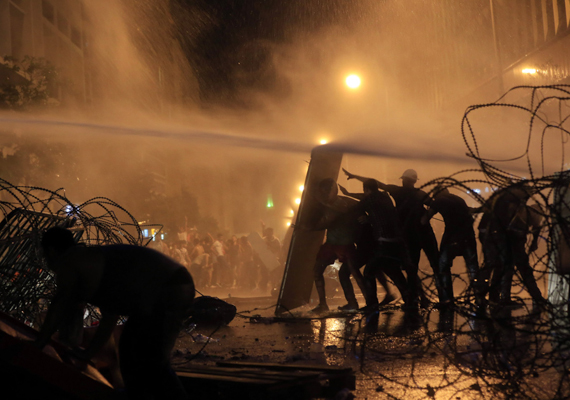The campaign aimed at ending the piles of rubbish in the streets of Beirut has brought to the forefront the “political garbage” plaguing the Lebanese people.
Since 23 April 2014, Lebanon’s parliament has been unable to reach a decision regarding the election of a new president, and leaving the struggling country without a president for more than 450 days. In a move regarded by many as unconstitutional, the parliament voted to extend its own mandate until 2017.
The main problem? Voting on whether parliamentary decisions should be made by consensus or simple majority. This political stagnation has been ineffective at dealing with immediate problems facing the country, especially in the face of the approximate 1.2 million refugees fleeing the nearby Syrian civil war.
Old dog, old tricks
As yet another shining example of the continued failure of the Lebanese government to find long-term solutions to infrastructure problems in place since the end of its own civil war in 1990, garbage collection has become the current hot-button issue.
“You Stink” was created once the main landfill site in central Lebanon closed after exceeding its capacity, and no acceptable alternative was offered. Communities surrounding the landfill had complained about dumping practices for years, blaming health problems on the build-up and smell.
After giving itself another two- to three-month extension on finding a solution to the trash problem, the government came face-to-face with nearly 20,000 protesters between Saturday evening and Sunday, displaying their dissatisfaction with the state of affairs.
From peace to pellets
The latest and greatest in a string of demonstrations by the growing “You Stink” movement, this weekend’s protests grew from hundreds to thousands of people walking and chanting through Beirut’s central streets piled high with reeking garbage.
Citizens, activists and journalists involved with the group have set out specific demands in the hope that advocacy of set goals will keep the movement together and their motives explicit. Besides the desire to find a fix to the infrastructure issues, demonstrators wish for the release of all individuals jailed over the course of the protests, as well as the immediate resignation of officials like the Minister of Environment, Mohammad Machnouk.
With an official start at 6PM local time, the You Stink protesters were immediately faced with a massive police presence that seemed at odds with the number of peaceful demonstrators. The numbers grew as the protest swelled to over 4,000 by the start of the demonstration.
Global Voices blogger Joey Ayoub was one of many to take to Twitter during the events unfolding over the weekend, and worked to make it clear that the way of the protest was strictly a nonviolent one. “We are committed to Non-Violent Direct Action [NVDA]. Entering Nejmeh Square is designed to put pressure on the government to meet out demands,” Ayoub Tweeted before the event.
Before the sun set over the tops of the central district’s buildings, the peaceful demonstration dissolved into chaos. Many with the movement criticized “dissenters” or “thugs” for instigating violence by throwing garbage and rocks at the police. But even stones against riot gear seemed a far cry from the water cannons, tear gas, and rubber bullets that soon were used against those in the square.
“The protests ceased to be about just trash the moment security forces started attacking protesters,” Tweeted French journalist Chloé Benoist, who was on-scene during the violence.
Aftermath
The Interior Minister, Nouhad Machnouk, stated that 99 members of the security forces and 61 civilians were injured across the weekend. However, reports by The Daily Star, a pan-Middle East English language newspaper edited in Beirut, put the number at 402 total injured with one man dying from a head wound received at the scene.
Conflicting information about how the man was injured has yet to be verified; some graphic photos were shared on Twitter alleging that the man had been one of many shot with live rounds from security forces.
Monday night’s planned third day of protest was postponed by organizers of the You Stink movement, after escalating violence by unaffiliated rioters caused them to regroup the event on Sunday evening. Despite the initial call by organizers, at least 2,000 individuals still arrived in Adlieh to demand accountability for the attacks by security forces.
“It’s not about trash,” begins one unnamed protester. “The trash crisis is the straw that broke the camel’s back.”
Visit the Global Voices Checkdesk page here for continued updates on the events surrounding the You Stink movement.
Feature photo part of a compilation put together by Alan Taylor, a senior editor with The Atlantic.

